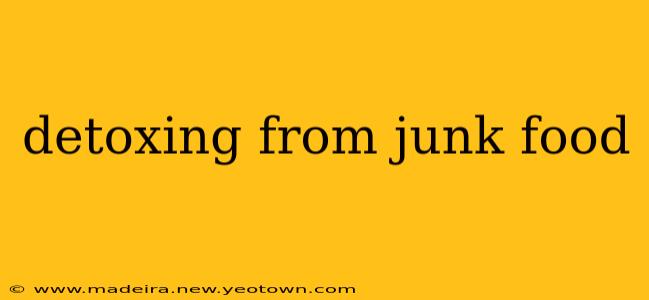Let's be honest, we've all been there. The siren song of salty chips, sugary sodas, and greasy burgers is powerful. But that post-junk food crash, the sluggishness, the guilt – it's not a sustainable way to live. Detoxing from junk food isn't about extreme diets or magical cleanses; it's about a mindful transition towards healthier eating habits. It's a journey, not a sprint, and this guide will help you navigate it successfully.
What Happens When You Stop Eating Junk Food?
This is a question many people ask, and the answer is multifaceted. Initially, you might experience withdrawal symptoms, like headaches, fatigue, and even cravings. This is your body adjusting to the absence of the processed sugars, unhealthy fats, and artificial ingredients it's become accustomed to. But as your body starts to heal, you'll notice positive changes: improved energy levels, clearer skin, better digestion, and a sharper mind. It's a testament to the incredible power of nourishing your body with real food.
How Long Does It Take to Detox From Junk Food?
There's no magic number. The timeline varies depending on how much junk food you consumed regularly, your overall health, and your commitment to the process. Some people might notice significant improvements within a week or two, while others might take several months to fully adjust. Be patient and kind to yourself – progress, not perfection, is the key.
What are the First Steps in a Junk Food Detox?
The initial stages are all about gradual change. Don't try to cut everything out cold turkey; it's a recipe for failure. Instead, focus on mindful substitution. Swap sugary sodas for sparkling water with a squeeze of lemon or lime. Replace processed snacks with fruits, vegetables, and nuts. Small, consistent changes accumulate over time to make a huge difference.
What Are the Best Foods to Eat During a Junk Food Detox?
Focus on whole, unprocessed foods. Think:
- Fruits and Vegetables: Packed with vitamins, minerals, and fiber, they're essential for detoxification and overall well-being.
- Lean Protein: Chicken, fish, beans, lentils – these help keep you feeling full and satisfied.
- Whole Grains: Opt for brown rice, quinoa, and oats over refined grains.
- Healthy Fats: Avocado, nuts, seeds, and olive oil provide essential fatty acids.
How Can I Manage Junk Food Cravings?
Cravings are inevitable, but you can manage them. Here are some strategies:
- Stay Hydrated: Sometimes thirst masquerades as hunger.
- Eat Regularly: Avoid extreme hunger, which can trigger intense cravings.
- Get Enough Sleep: Lack of sleep can exacerbate cravings.
- Find Healthy Substitutes: When a craving hits, reach for a healthier alternative, like a piece of fruit or a handful of nuts.
- Mindful Eating: Pay attention to your body's hunger and fullness cues.
What are the Benefits of Detoxing From Junk Food?
The rewards extend far beyond just weight loss. You'll experience:
- Improved Energy Levels: Say goodbye to the afternoon slump!
- Better Sleep: Nourishing your body with whole foods supports better sleep quality.
- Clearer Skin: Junk food can contribute to acne and other skin problems.
- Improved Digestion: Whole foods are easier on your digestive system.
- Enhanced Mood: A healthy diet significantly impacts mental well-being.
Detoxing from junk food is a journey towards a healthier, happier you. It's not about deprivation; it's about making conscious choices that nourish your body and mind. Remember to be patient, celebrate your successes, and enjoy the process of rediscovering the pleasure of real food. Your body will thank you for it.

